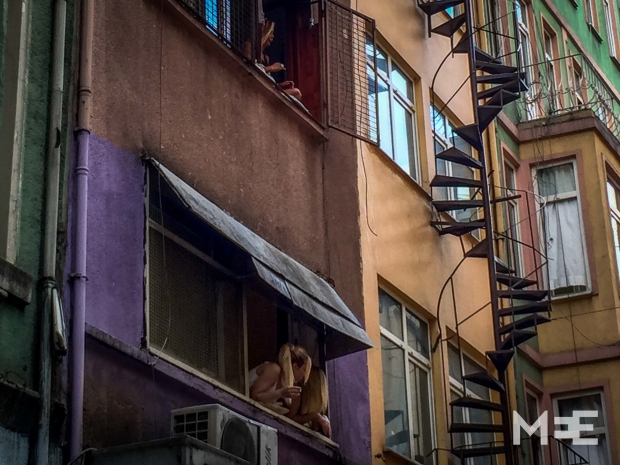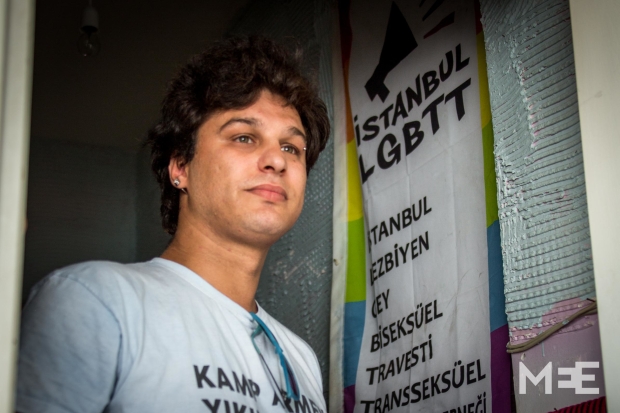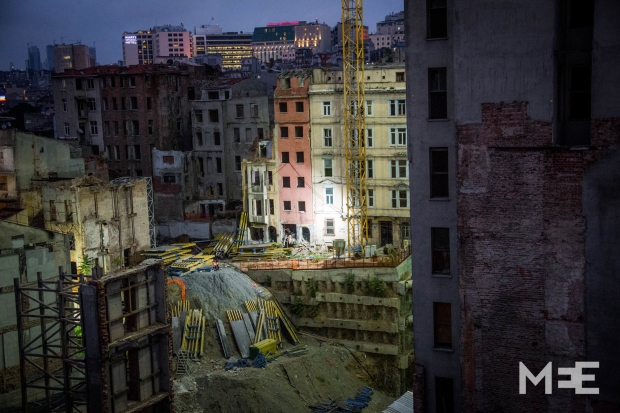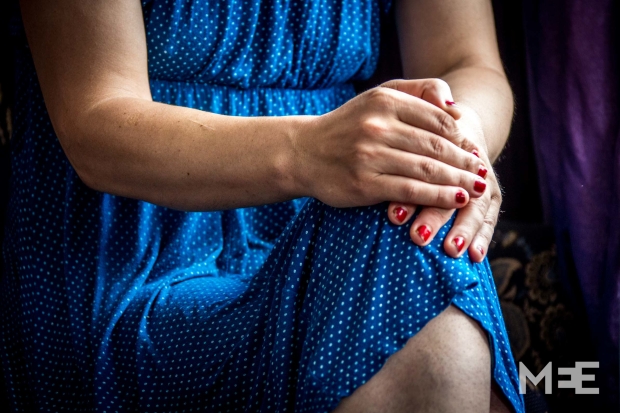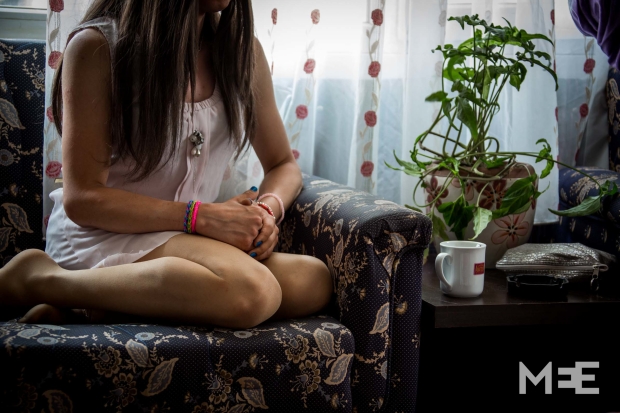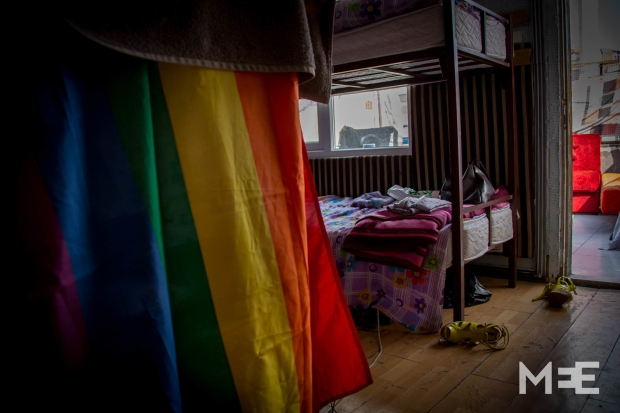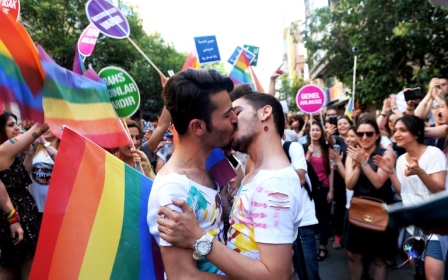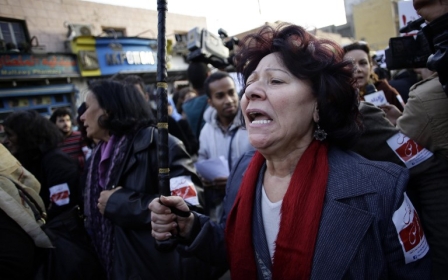Suffering and loss in Istanbul’s transgender slum

The softly lit, tiny room we spoke in had just enough space for a single bed where my female interpreter and Tughe, a transgender sex worker, were perched, while this interviewer sat on the floor. It smelt heavily of perfume, cigarettes, and faintly of sweat. We had to keep our voices low - a man with a camera and a female interpreter would scare away customers and draw trouble. Tughe looked at us curiously as she told me how she came to work in this brothel in central Istanbul after being seriously assaulted.
She was attacked by two Turkish men while working on the street. “They [abducted] me, beat me, raped me, and left me naked in a wood. I walked for hours, my feet were bleeding. When I came to a main road there was another group of five young men. They also started to assault me. A police car drove past, and the cops said, “Take this faggot, and do whatever you need to.”
For transgender people in Turkey, these types of incidents, rather than being a tragic crime worthy of prosecution, are almost an inevitability.
Deadly reality
Turkey is the most dangerous place to be a transgender person in Europe, accounting for over a third of all murders of trans persons in the continent. Between January 2008 and September 2014 there have been at least 36 murders of transgender people in Turkey, according to the monitoring project TransRespect vs TransPhobia, which is funded by the Open Society Foundation. Turkey equals the total number of murder cases involving transgender victims of its most dangerous counterpart in Asia, India; although India has a population size more than 16 times that of Turkey.
In a shelter for homeless transgender persons, I ask Deniz, coordinator of the LGBT organisation in Istanbul, about the murder rates of trans persons, and he tells me how it’s the tip of the iceberg - many trans persons are murdered by their families as "honour killings" here, and many, many more are severely assaulted, and both of these type of crimes simply go unreported.
The odds of getting justice within the Turkish legal system are stacked against transgender people. “Our murderers end up being released very quickly, if they even get imprisoned in the first place,” Deniz tells me. The LGBT organisation has barely any resources, and has not been able to monitor the scale of violence against the community.
Transgender ghetto
A few hundred metres away from the brothel where we met Tughe lies Tarlabasi, the shell of a ghetto which used to be the only safe haven for the transgender community in Turkey. Twenty years ago, Tarlabasi was a more open-minded neighbourhood, comprised mostly of Greek high society, and one in which a fledgling transgender community was accepted.
Over time, many minority communities have come and left Tarlabasi: Greeks, Roma and Kurds. The transgender community, tolerated here unlike elsewhere in Turkey, began to grow. However, as Istanbul has grown as an international destination so too have its property prices, and the centrally located Tarlabasi neighbourhood has faced gentrification and redevelopment projects which have forced out poorer communities.
Many transgender people felt the urban transformation plan was also an opportunity to break up and remove them. Minimal compensation was offered to transgender homeowners; at about $14,600 for a flat, it was a paltry price and less than a quarter of the going price for a similar property elsewhere in Istanbul. As options to stay with relatives are limited (many male family members disown their transgender offspring), many have had to stay with friends, or move much further afield.
The coastal town of Izmir in western Turkey is where many have relocated. Locals estimate the number of transgender people living in Tarlabasi has reduced from hundreds to just seven or eight individuals. Faced with inevitable demolition of their homes, an unsupportive government and conservative society, the transgender community in Turkey faces an uncertain and vulnerable future.
Media silence
Social issues such as transgender rights and redevelopment resistance are rarely covered by local media. Academic activist group Reclaim Istanbul researched the issue and its power relations in a project called Networks of Dispossession. Released in July 2014, their findings revealed that some of the more controversial urban transformation projects in Istanbul, such as Tarlabasi, were managed by Gap Construction, which is owned by Calik Holding, which also controls various media outlets across the country. Calik Holdings did not respond to requests for comment from MEE.
Combined with the conservative disposition of state media against Lesbian Gay Bisexual Transvestite and Transsexual (LGBTT) rights, it seems unlikely that the issue of the now-broken transgender community in Tarlabasi will receive much light in Turkey.
Deniz, the LGBTT coordinator, seems frustrated not so much by censorship in domestic media, but by the lack of international support for the protection of transgender people, and the LGBTT group more broadly, in Turkey. Drawing on a cigarette, Deniz tells me a foreign woman asked him last year, “Why don’t you make your Pride march into a whole festival instead?” Exasperated, he said, “She didn’t understand that we’re still fighting for our right to life, not even our civil rights just yet.” Riot police broke up this year’s Pride March in Istanbul with water cannons.
Poverty and refuge
Most transgender people in Turkey are poverty stricken. Funda, a 42-year-old transgender person spoke in a trans-friendly bar in Tarlabasi about the difficulties of finding any employment as a transgender person in Turkey. “There are no opportunities to work. What can we do? Prostitution, hairdressing, makeup. Sometimes a few can become shopkeepers of their own place.” It seems like a vicious cycle. The negligible opportunity to earn a living makes the prospect of losing one’s home even more problematic.
Some transgender people are now simply too old for sex work. The LGBTT organisation has established a shelter for them in Istanbul, run on a shoestring budget - it is hand to mouth living. It’s located in a rougher part of the neighbourhood, so a curfew is set at 10pm.
The shelter has space for about 20 people in three cramped dorm rooms, and although intended for "retired" transgender persons, the shelter finds it difficult to turn away those in need. Some LGBTT Syrian refugees are bunking here, as well as young transgender people who have run away from home. The organisation does not want to push people out who have nothing else, but with limited beds and increased numbers of homeless transgender people, it is faced with a dilemma.
The price of coming out
We meet Elif, a 20-year-old trans person, also in the shelter. She has just started her transformation. Less than a year ago she was confused by her feelings. Depressed, she attempted suicide by drug overdose, but awoke in a hospital. Screened by a psychologist, she was suggested for cross-sex hormonal treatment and gender reassignment surgery.
She came out to her family, but was disowned - her father told her to never return, and left her belongings in a bag in front of the building. After some time looking, with nowhere left to turn, she was referred to the centre. She knows that her mother, silenced by her father, still cares for her, and they once made a secret plan to meet up after midnight, after everyone was asleep. “She didn’t call me son, or even daughter, anymore. She just said ‘my child,’ and hugged me.”
The shelter is a new family for Elif, but she still needs money to survive. Having been let go from her job in a call centre immediately after coming out a few months ago, she had only started 10 nights ago as a sex worker on the streets, and had six customers in that period. The first time she left for "work" she felt deeply ashamed. The first client was an athletic 23-year-old, who was kind, she said. She earned $25 that night, and used it to buy some medicine her mother couldn’t afford - this made her feel better. She is still adjusting. Elif laces her high heels up and leaves us for her seventh night shift soliciting on the street. I quietly hope she doesn’t relive Tughe’s experience.
A world of contradictions
Transgender sex workers are surprisingly popular in Istanbul. I walk past a pair of young Turkish men staring at a transgender person smiling through the barred window of a brothel: “… but they’re not women” one said to the other, “but they’re so much better,” the other responds. On one hand, Turkish society condemns transgender sex workers, whilst on the other, they’re a coveted sexual release. Like other taboos, it’s a difficult position for society to reconcile, but hopefully a hypocrisy that might diminish in a country just entering a period of sexual liberalisation.
New MEE newsletter: Jerusalem Dispatch
Sign up to get the latest insights and analysis on Israel-Palestine, alongside Turkey Unpacked and other MEE newsletters
Middle East Eye delivers independent and unrivalled coverage and analysis of the Middle East, North Africa and beyond. To learn more about republishing this content and the associated fees, please fill out this form. More about MEE can be found here.


